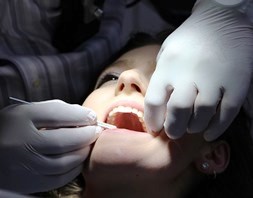Dental Hygiene Training Programs
How to Select the Best One Near Jersey City New Jersey
 Selecting the ideal dental hygienist program near Jersey City NJ is an essential initial step toward launching your new career in dentistry. However, you need to assess and compare your school options before you can make your final choice. Choosing the college with the most affordable tuition or enrolling in the program that is nearest to your residence is not the right way to make your decision. There are other important factors to take into account also, including the program's accreditation and reputation. A dental hygienist usually must spend anywhere from two to three years to complete an Associate Degree, in contrast to a certificate typically earned by dental assistants in about a year. Naturally with the lengthier training of a hygienist comes more cost. We will talk about all of these factors and additional questions that you need to be asking the dental hygienist programs you are reviewing later in this article. But first, let's look at the duties of dental hygienists and the training programs provided.
Selecting the ideal dental hygienist program near Jersey City NJ is an essential initial step toward launching your new career in dentistry. However, you need to assess and compare your school options before you can make your final choice. Choosing the college with the most affordable tuition or enrolling in the program that is nearest to your residence is not the right way to make your decision. There are other important factors to take into account also, including the program's accreditation and reputation. A dental hygienist usually must spend anywhere from two to three years to complete an Associate Degree, in contrast to a certificate typically earned by dental assistants in about a year. Naturally with the lengthier training of a hygienist comes more cost. We will talk about all of these factors and additional questions that you need to be asking the dental hygienist programs you are reviewing later in this article. But first, let's look at the duties of dental hygienists and the training programs provided.
It Takes Just a Few Minutes to Start Your Dental Hygienist Career Below
Dental Hygienist Job Description

When comparing the job of a dental hygienist to that of an assistant, the most significant difference is undoubtedly that the hygienist works more independently. Dental assistants work with and assists the Jersey City NJ practice and the dentists. Hygienists, while also assisting the practice, work with the patients more on a one-to-one basis. They are often the initial person a patient interacts with when called from the waiting room. They examine each patient's teeth and gums and present their findings to the dentists. They may also carry out basic procedures. Based on state law, a hygienist's responsibilities can include:
- Removing stains, tartar and plaque
- Applying fluoride treatments
- Applying sealants and polishing teeth
- Teaching patients about oral care
- Taking X-rays and developing film
- Applying fillings and removing sutures
Dental Hygienist Education Options
Due to the added responsibility in contrast to an assistant, dental hygienists employed in Jersey City NJ dental offices are often required to have an Associate Degree in dental hygiene rather than a certificate. These programs can take anywhere from 2 to as long as 3 years to finish and must be accredited by the CDA in almost every state. They are offered in community colleges as well as trade and technical schools. And in addition to classroom studies learning the fundamentals of dental hygiene, there will be a clinical component to the training as well. Some programs also offer internships with local dental practices or dentists.Online Dental Hygienist Programs
 Choosing an online dental hygienist school can be a good option for getting your education. Just remember that the classes will not be 100% online, since there will be a practical portion to your training. But the remainder of your classes will be provided via your personal computer in the convenience of your Jersey City NJ home or anywhere else on your laptop or tablet. For those continuing to work while attending college, online dental programs make education much more obtainable. Many may even charge lower tuition rates than their traditional counterparts. And supplementary expenses for items like books, school supplies and commuting may be lessened also. The clinical training can typically be completed at a community dental practice or in an on-campus lab. With both the clinical and online training, everything required to get the proper education is provided. If you have the dedication for this method of learning, you may find that attending an online dental hygienist program is the right choice for you.
Choosing an online dental hygienist school can be a good option for getting your education. Just remember that the classes will not be 100% online, since there will be a practical portion to your training. But the remainder of your classes will be provided via your personal computer in the convenience of your Jersey City NJ home or anywhere else on your laptop or tablet. For those continuing to work while attending college, online dental programs make education much more obtainable. Many may even charge lower tuition rates than their traditional counterparts. And supplementary expenses for items like books, school supplies and commuting may be lessened also. The clinical training can typically be completed at a community dental practice or in an on-campus lab. With both the clinical and online training, everything required to get the proper education is provided. If you have the dedication for this method of learning, you may find that attending an online dental hygienist program is the right choice for you.
Questions to Ask Dental Hygienist Schools
Now that you have decided to become a dental hygienist in Jersey City NJ, you can begin the procedure of comparing schools and programs. As we discussed at the beginning of this article, many potential students begin by checking out the cost and the location of the schools. Perhaps they search for several online options as well. Although these may be significant initial considerations, there are several additional questions that you need to address to the programs you are reviewing in order to arrive at an informed decision. To start that process, we have provided a list of questions to help you with your due diligence and ultimate selection of the best dental hygienist program for you.
Is the Dental Program Accredited? There are many good reasons why you should only choose an accredited dental hygienist school. If you are planning to become certified or licensed, then accreditation is a condition in almost all states. To qualify to take the National Board Dental Hygiene Examination, your dental program must be accredited by the Commission on Dental Accreditation (CDA). Accreditation also helps guarantee that the training you receive is comprehensive and of the highest quality. Jersey City NJ employers typically desire or require that new hires are graduates of accredited schools. And last, if you are applying for financial aid or a student loan, frequently they are not provided for non-accredited colleges.
Is Adequate Practical Training Provided? Practical or clinical training is an essential component of any dental training program. This holds true for the online school options also. Many dental hygienist schools have partnerships with area dental offices and clinics that provide clinical training for their students. It's not only important that the college you select offers sufficient clinical hours but also provides them in the kind of practice that you ultimately want to work in. As an example, if you have an interest in a career in pediatric dentistry, confirm that the program you choose offers clinical rotation in a local Jersey City NJ dental office that specializes in dental treatment for children.
Is There an Internship Program? Ask if the dental programs you are looking at sponsor an internship program. Internships are probably the most effective means to get hands-on, practical experience in a real dental practice. They make it easier for students to transition from the theoretical to the practical. They can also help students create working relationships in the professional dental community. And they look good on resumes as well.
Is Job Placement Support Provided? Many graduating students of dental hygienist programs need help getting their first job. Ask if the colleges you are considering have job placement programs, and what their job placement rates are. Programs with higher job placement rates are likely to have good reputations within the Jersey City NJ dental community as well as broad networks of contacts where they can refer their students for internships or employment.
Are Classes Small? Check with the colleges you are reviewing how large typically their classrooms are. The smaller classes usually offer a more personal environment for training where students have greater access to the instructors. On the other hand, larger classes can be impersonal and offer little individualized instruction. If practical, ask if you can sit in on a few classes at the Jersey City NJ dental hygienist college that you are most interested in so that you can experience first hand the amount of interaction between teachers and students before making a commitment.
What is the Total Expense of the Program? Dental hygiene schools can fluctuate in cost based on the length of the program and the volume of clinical training provided. Other factors, for example the reputations of the schools and if they are private or public also come into play. But besides the tuition there are other significant expenses which can add up. They can include expenses for such things as commuting and textbooks as well as school equipment, materials and supplies. So when comparing the cost of programs, don't forget to add all of the costs associated with your education. The majority of schools have financial assistance departments, so be sure to check out what is offered as far as loans, grants and scholarships in the Jersey City NJ area.
Are the Classes Convenient? Before enrolling in a dental hygienist school, you need to make sure that the hygienist or assistant program furnishes classes that accommodate your schedule. This is especially true if you will be working while acquiring your education and must go to classes near Jersey City NJ at nights or on weekends. And even if you choose an online school, you will still have to schedule your clinical training classes. Also, while addressing your concerns, ask what the make-up practice is if you should need to miss any classes because of work, illness or family responsibilities.
Find Out More About How to Become a Dental Hygienist in Jersey City
Pick the Right Jersey City Dental Hygienist Program
Selecting the ideal dental hygienist program is crucial if you wish to take the National Board Dental Hygiene examination or, if mandated in your state, become licensed. As we have covered, there are many options available to receive your training and it takes a fairly short period of time to become a dental hygienist. You can obtain your formal training through dental hygienist programs at community colleges, technical institutes, trade schools and vocational schools. Graduates of these programs normally receive an Associate Degree. Dental Hygienists usually require about 2 years of studies prior to entering the job market. When earning a degree you can elect to go to classes on-campus or online. Whichever mode of training you elect to pursue, by asking the questions presented in this article you will be better prepared to make the ideal choice. And as a result, you will be ready to begin your journey toward becoming a dental hygienist in Jersey City New Jersey.
Jersey City Dental Hygienist Degree | Jersey City Dental Hygienist Schools Online
